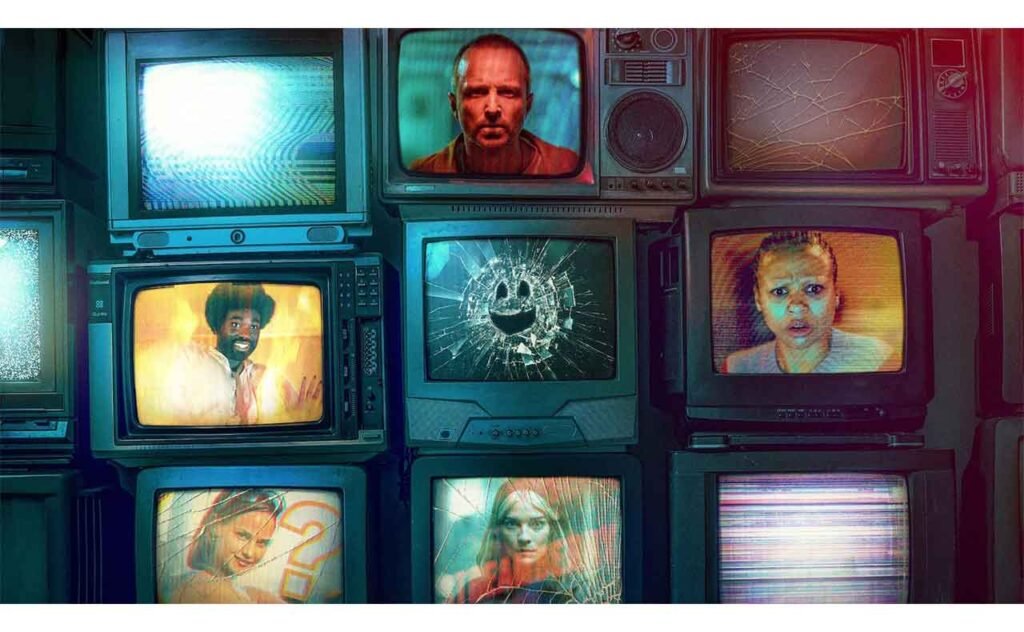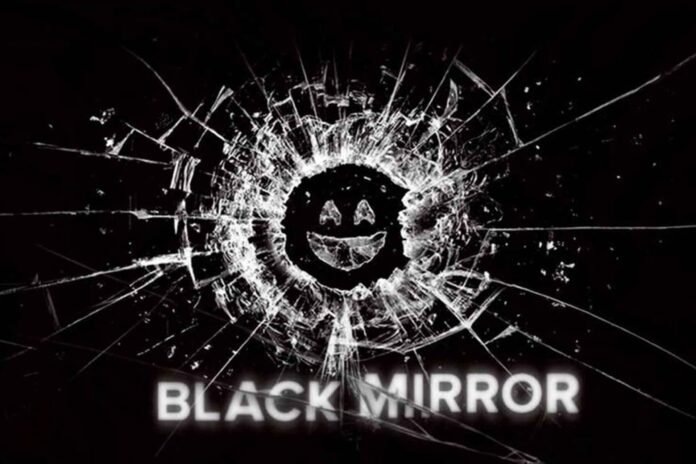What happens when innovation outpaces morality?
When Charlie Brooker first introduced Black Mirror to the world in 2011, he didn’t just create a dystopian anthology series—he launched a modern cultural mirror. Each standalone episode of Black Mirror peels back the glossy surface of technological progress to reveal unsettling, often horrifying consequences of our digital ambitions.
In this blog, we’ll explore:
- The origins and structure of the series
- Key episodes and their central messages
- Black Mirror’s technological predictions
- The ethical warnings hidden beneath the narratives
- Why the series matters more than ever in 2025

📺 The Genesis of Black Mirror: A Techno-Parable for the Digital Age
Created by Charlie Brooker and originally aired on Channel 4 in the UK before being acquired by Netflix, Black Mirror borrows its name from the black screens of smartphones, tablets, and TVs—our constant companions and silent witnesses.
Brooker’s vision was simple yet powerful: take today’s technologies and extend them just a little bit into the future. The result is a haunting look at “the way we live now—and the way we might be living in 10 minutes’ time if we’re clumsy.”
Each episode stands alone, a mini film between 45–90 minutes. There’s no linear narrative or recurring characters. The only constant is the unsettling presence of technology and its impact on humanity.

🧠 Tech Themes in Black Mirror: A Breakdown
Let’s break down the key technological concepts Black Mirror repeatedly explores:
1. Surveillance and Privacy
- Episode: “The Entire History of You”
- Tech Premise: A memory-implant allows users to replay every moment of their lives.
- Message: Absolute memory might seem ideal—but it undermines trust, intimacy, and mental well-being.
2. AI, Consciousness Uploading & Digital Afterlife
- Episodes: “San Junipero”, “White Christmas”, “Black Museum”
- Tech Premise: Minds can be uploaded, duplicated, or stored in simulations.
- Message: Immortality comes at a price. The soul is not code. Consciousness replication raises disturbing ethical dilemmas.
3. Social Credit and Digital Validation
- Episode: “Nosedive”
- Tech Premise: A society where every interaction affects your social score.
- Message: In an age of likes and shares, how much of ourselves do we sell to gain acceptance?
4. Mass Media and Political Manipulation
- Episodes: “The Waldo Moment”, “Fifteen Million Merits”
- Tech Premise: Media and gamified systems become tools of oppression.
- Message: Entertainment, when weaponized, distracts, manipulates, and dumbs down public discourse.
5. Artificial Companionship and Robotics
- Episodes: “Be Right Back”, “Metalhead”, “Ashley Too”
- Tech Premise: Robotics and AI simulate humans or replace relationships.
- Message: Emotional reliance on machines leads to emotional ruin. Technology can mimic—but not replace—authentic connection.
6. Gaming, Virtual Reality & Escapism
- Episodes: “Playtest”, “USS Callister”, “Striking Vipers”
- Tech Premise: Immersive gaming blurs reality.
- Message: Escapism can easily transform into digital imprisonment or identity dissolution.

🔮 Predictions That Became Reality
Black Mirror isn’t just speculative fiction. Many of its concepts have already materialized, such as:
- China’s Social Credit System (Nosedive, real by 2018)
- Alexa & AI Companions (Ashley Too, echoing Amazon Echo and more)
- Deepfakes & Digital Resurrection (Be Right Back, now possible through AI-generated avatars)
- Virtual Reality Games (USS Callister, now with Meta Quest & PSVR)
- Smart Glasses & Memory Capture (Entire History of You, approaching with Ray-Ban Meta)
Its uncanny foresight has made the show a tech prophecy machine—and a cautionary tale.
⚖️ Ethical Dilemmas & Human Struggles
What makes Black Mirror resonate isn’t just the tech—it’s the moral complexity:
- Should we resurrect lost loved ones through AI?
- Is it ethical to punish digital clones?
- Can love survive when every action is recorded and reviewed?
- What does identity mean in a world of avatars and simulations?
Each episode pushes viewers to confront difficult ethical questions—questions our real-world tech leaders often ignore in favor of growth and innovation.
🏙️ The World of Black Mirror in 2025
As we navigate an era of:
- AI-generated content
- ChatGPT-like assistants embedded in everything
- Digital twins of people and pets
- Deepfakes that deceive even the smartest minds
- Surveillance capitalism and hyper-targeted ads
We find ourselves living in a semi-Black Mirror reality. The line between fiction and reality has blurred.
And that’s the genius of Black Mirror: it doesn’t predict the future—it explains the present.
💡 Why Black Mirror Still Matters
Black Mirror teaches us:
- Not all progress is good progress
- Technology must be grounded in ethics
- Human connection is irreplaceable
- Privacy is a right, not a tradeoff
- Awareness is the first step toward resistance
It encourages viewers—tech creators, consumers, policymakers—to think before we build, question before we adopt, and feel before we code.
📢 Final Thoughts: It’s Not Just a Show, It’s a Warning
As Techgifta explores the intersection of technology, humanity, and innovation, Black Mirror stands as one of the most relevant cultural texts of our era.
It’s more than entertainment. It’s a black mirror reflecting our obsessions, ambitions, and anxieties. And as we race toward an AI-augmented future, it’s a reminder that every tap, swipe, and upload carries consequences.
The real question is: Are we listening?
What is Black Mirror?
Netflix’s popular series Black Mirror is a production that questions contemporary society and the effects of technology by presenting each episode as an independent story. Created by Charlie Brooker, this series takes a pessimistic view of people’s relationship with technology and often deals with dystopian future scenarios.
Technological Messages and Themes
Black Mirror shows viewers the complex relationships between technology and humanity. The series deals with many topics from virtual reality to social media addiction, artificial intelligence to data privacy. Each episode provides viewers with a tool to think about the potential dangers and opportunities of technology.
Social Criticism and Future Vision
The episodes of the series criticize the difficulties presented by modern society. While examining the effects of technology on human psychology, Black Mirror often draws a dark and striking vision of the future. In this context, each episode of the series causes viewers to think deeply about many issues, from social media habits to loneliness.
✍️ SEO Title:
The Chilling Truth Behind Black Mirror: Tech Predictions and Ethical Warnings in 2025
🔍 SEO Keywords:
Black Mirror analysis, Black Mirror technology predictions, Black Mirror ethical messages, AI and society, tech dystopia, virtual reality, digital consciousness, Charlie Brooker, tech warnings, future of technology
📝 Meta Description:
Explore Black Mirror like never before. Discover the tech predictions, ethical dilemmas, and real-world reflections of the groundbreaking series. A must-read for every tech lover in 2025.



